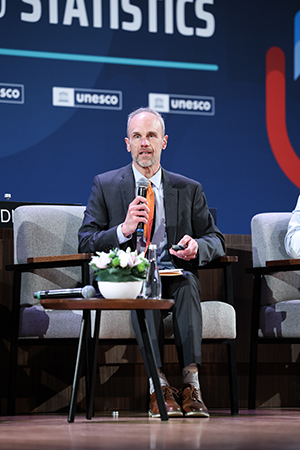Sharing Best Practices on a Global Stage
 |
| Doug Casey speaks at the UNESCO conference in Paris |
A lot of us are parents and saw firsthand how our students had to switch to online learning, almost overnight, during the pandemic. DAS’s Commission for Educational Technology partnered with other agencies to equip students with the computers and connections they needed to connect to their teachers and classmates, and the use of educational technology has been increasing ever since.
The "footprint" of all this technology has led to more tracking and data collection — by some measures, a 50 percent increase year over year — of kids’ learning activities. The Commission has served a critical advisory role in this space for years in supporting school leaders, teachers, and families. The solutions we have put in place to help schools use emerging technologies such as AI while at the same time ensuring the privacy of student information have saved districts an estimated $6 million.
Part of tackling any problem is working with smart people who have the same challenges. It’s one of the reasons I participate in an international working group on educational data through the United Nations Educational, Scientific and Cultural Organization (UNESCO). Members of that team share strategies for data governance and transparency that reflect cultural norms and traditions — for example, American independence versus German structure and order — as much as technology capabilities.
Earlier this month, I had the opportunity to travel to Paris for the first UNESCO Conference on Education Data and Statistics. Speakers from Europe, Africa, Asia, and the Americas addressed common challenges, all through the common goal of ensuring educational opportunities. During the event, I participated on a panel that addressed the role of emerging technologies to accelerate learning. During our session, I shared an overview of the US education system and how our Commission has equipped schools to do more with technology, highlighted in UNESCO’s most recent report, The Transformative Potential of Data for Learning. Our panel included leaders from Saudi Arabia, Colombia, Syria, Gambia, Indonesia, Brazil, and Spain, all sharing insights on both the opportunities and risks that artificial intelligence (AI) poses to education.
As I listened to Alpha Bah of Gambia — a country smaller than Connecticut — discuss the challenge of sustaining technology investments for education, I remarked that the United States has the same challenges, albeit on a different scale. And his advice on how to use simple messaging services in addition to robust education apps inspired me to keep thinking creatively about how to help our schools do more to reach students and families.

